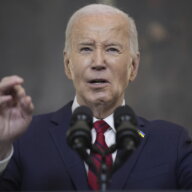Pennsylvania Democratic Governor Tom Wolf delivered his 2019 budget address before a joint session of the Republican-controlled legislature on Tuesday. The York native and former cabinet-maker who was reelected to a second term last November, laid out priorities including workforce development, more funding for education, and more spending for state infrastructure.
It was a far smoother delivery than just years ago for Wolf, a Democrat who cruised into office in 2014 after a campaign buoyed by $10 million of his own wealth.
In 2016, Wolf got booed while delivering his budget address, which came while the previous year’s budget still hadn’t been agreed upon – a stalemate driven in part by his insistence no more public education funding.
But years later, Wolf is still pushing the same ideas, but now with more political clout, respect from fellow legislators, and a natural gas industry that in the Keystone State seems to be in retreat from the fracking boom of five years ago.
The budget calls for $200 million more for basic education, increasing the state minimum wage to $12 an hour as of July, and more. Weeks of budget hearings will now follow before a final budget is agreed upon or signed by Wolf, but here are three specific things we learned Wolf is planning.
1. Wolf: ‘No new taxes.’
Gov. Wolf has been slammed in the past by the Republican legislative majorities in Harrisburg for any move toward increasing taxes in the state. Wolf cast himself in a different light early in his speech: “Let me cut to the chase. This proposal asks for no new taxes. Not one dollar. Not one dime. Not one penny,” Wolf said to applause.
Republicans were supportive of the idea in general but skeptical, given Wolf is currently pushing for a new severance or extraction tax on natural gas drillers, pitched as a way to fund a $4.5 billion state infrastructure upgrade.
“Many of his expectations are not aligned with reality,” said Val DiGiorgio, Pennsylvania GOP chairman, in a response to Wolf’s budget. “Whether it’s calling for an irresponsible borrow and tax plan that holds Pennsylvania’s energy industry hostage to putting more government mandates on small businesses while our economy is booming, Pennsylvanians should be wary of a total buy-in to the Governor’s plan.
2. Wolf wants jobs
Wolf spoke at length about preserving and growing jobs in the Commonwealth, a topic popular with Republicans, and said he will soon use an executive order to open the Keystone Economic Development and Workforce Command Center. The center would unite leaders from state agencies and experts to track trends in employment and rspond.
House Republicans said they support the plan but also think “regulatory and tax reforms” could help create new jobs.
3. Wolf still loves public school teachers.
Gov. Wolf has made education funding, particularly for public schools, a central priority of his administration.
In his budget address, Wolf called for raising the minimum teachers’ salary to $45,000 – up from $18,000, under a law that Wolf said hasn’t been updated since the 1980s – using a full-funded mandate within state budgets.
The raise would mostly benefit teachers in rural districts, Wolf said.
Approximately 3,000 teachers would get a raise under the proposal, WHYY reported. While the average teacher’s salary in the state is around $67,535, in 183 school districts around the state teachers are paid less than $45,000, and in five districts the average is lower than that figure.
In his 2018 reelection campaign, educators’ groups were among Wolf’s top donors: the statewide teachers union Pennsylvania State Education Association donated $1.5 million, the American Federation of Teachers donated $700,000, and the Pennsylvania Federation of Teachers kicked in $125,000.





























